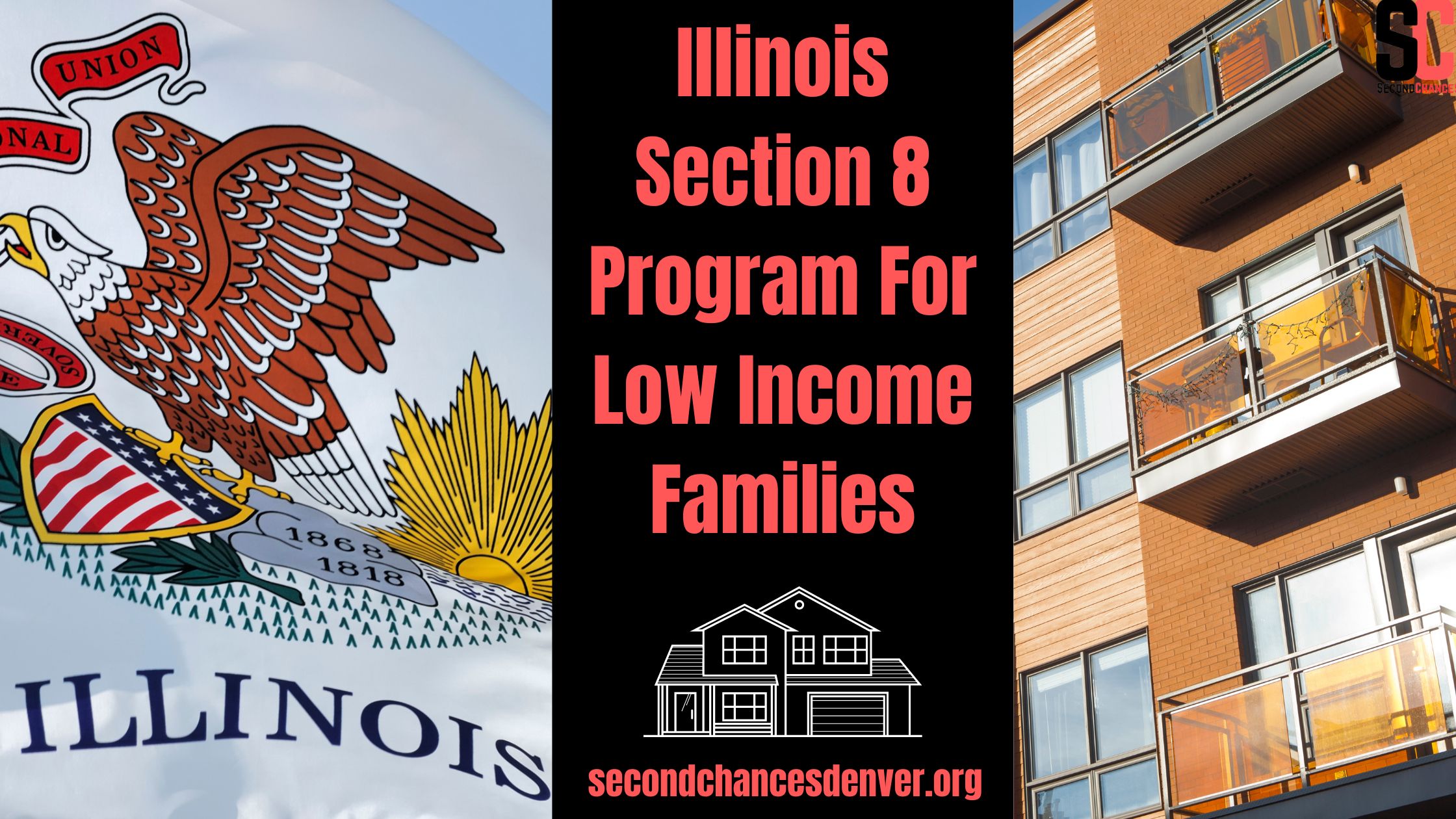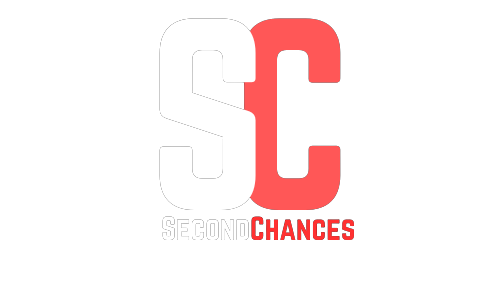Are you an Illinois resident and want to know how to apply for the Illinois Section 8 Program For Low Income Families? You’re in the right place.
You and your children should have a safe and secure place to live for many reasons. The cost of living is one of the biggest obstacles to finding an affordable place to live. The Aurora or Chicago, Illinois, areas may offer Section 8 housing or assistance to residents who are not well off financially or have recently faced financial difficulties.
Here, we will explore everything you need to know about the Illinois Section 8 Program For Low Income Families, eligibility criteria, the application process, and much more. We have provided some tips and answers to some of the most common questions you may have.
Let’s get started.
Table of Contents
Explore Illinois
Illinois is located in the middle of the Midwest, bordering Indiana to the east and the Mississippi River to the west. It is known as “the Prairie State” due to its agricultural landscape, forests, rolling hills, and wetlands. The largest city in the U.S., Chicago, lies along the shores of Lake Michigan in the northeast. The city is known for its skyscrapers, such as the sleek 1,451-foot Willis Tower and the neo-gothic Tribune Tower.
What is A Housing Choice Voucher?
Housing choice vouchers (HCV) are documents that indicate the exact amount of housing assistance you have been approved for. After you receive the voucher and final approval, you can begin searching for an apartment to live in with your children. If you already have a landlord, ask him if he accepts these vouchers. In that case, you can forward the paperwork to him so he can process your request. It is important to remember that a voucher cannot prevent eviction. There is usually only one month of validity on vouchers. At your local regional office, you can apply for a voucher, and a resource center is available to answer your questions.
What is Section 8 Housing?
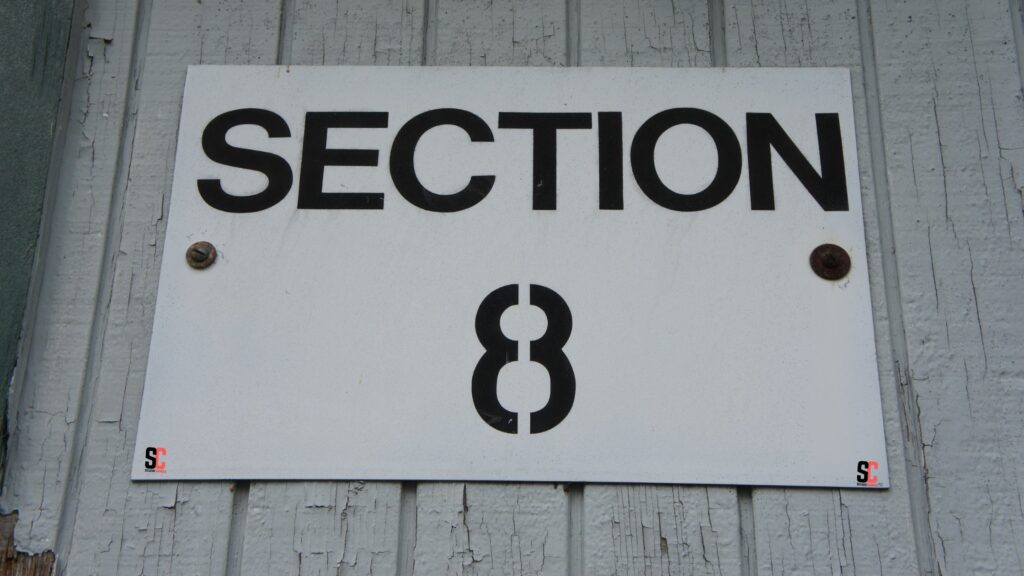
Section 8 housing was authorized under the Housing Act of 1937. The program provides safe and sanitary shelters for low-income, disabled, and elderly individuals. This is accomplished through a program called Housing Choice Vouchers.
A voucher is a portable subsidy that can help low-income families reduce their rent each month. HUD oversees and funds the program, but the vouchers are administered by local public housing agencies.
The PHA determines eligibility based on the size of the family and the total gross income of the household. It is necessary for your gross annual income to be below 50% of the median income for that area to qualify. According to law, 75% of the vouchers must be given to families earning less than 30% of the area’s median income.
Section 8 housing applicants must pay rent and utilities at 30% of their adjusted gross income. The PHA managing the family’s voucher pays 70% of the remaining funds directly to the landlord.
What is Illinois Section 8 Program For Low Income Families?
In Illinois, the Section 8 Housing Choice Voucher Program helps low-income families find affordable housing. This is a federally funded program administered by the Department of Housing and Urban Development. An apartment or house payment is used to cover most monthly housing expenses. The amount and type of voucher you receive will depend on many factors, especially your monthly and annual income. The vouchers you receive are valid for the specified period of time that they are approved for. If it expires, you may need to reapply. Remember that not all landlords and mortgage companies accept housing vouchers, so ask before applying.
Who Can Qualify For Illinois Section 8 Program For Low Income Families?
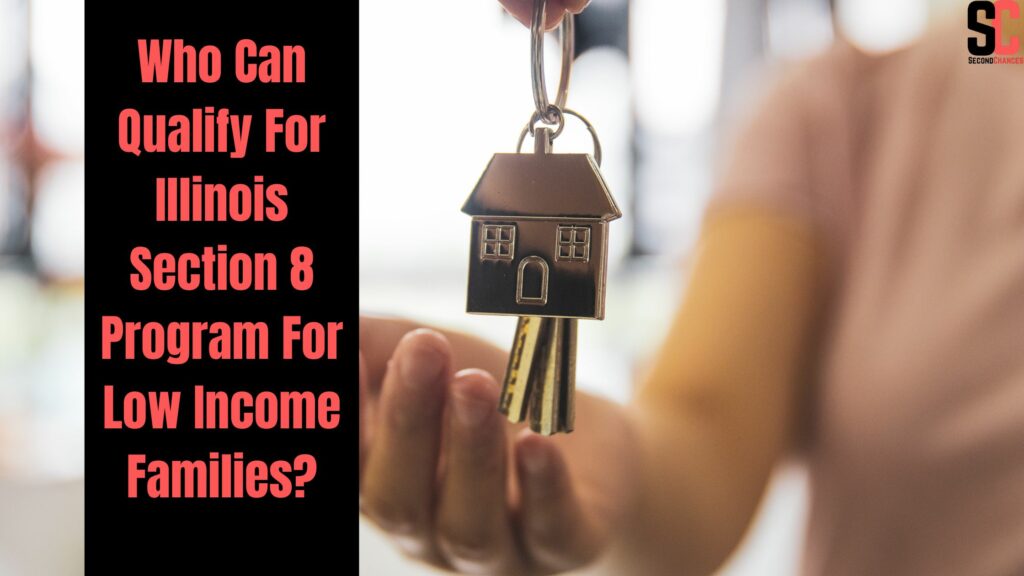
The main factor that determines your eligibility is your household income. The low-income limit for Illinois residents is $41,500 for a household of one and $78,250 for households of eight. Additionally, there are extremely low-income and very low-income income limits that help categorize your household income. The lower your household income, the better your chances of receiving Illinois Section 8 assistance.
There are also the following factors to consider:
- A household member with a disability
- The elderly member of a household
The ability to accommodate your circumstance will be prioritized if you or someone in your household is disabled or elderly.
The federal government operates the Section 8 program, so HUD has its requirements:
- A household applying for Illinois Section 8 must be at least 18 years old.
- Each household member over 18 will be held accountable for their income contribution.
- A tenant must not have a history of nonpayment of rent or damage to property.
- A criminal record involving drug trafficking or sexual offenses is not acceptable.
- A Section 8 apartment cannot be associated with the manufacture of methamphetamine.
- You are a citizen or permanent resident of the United States.
- You are a resident of the state of Illinois.
If you meet these requirements, you will qualify for Illinois Section 8 Program For Low Income Families and be eligible to apply for either a Housing Choice Voucher or a public housing project.
How To Apply For Illinois Section 8 Program For Low Income Families?
The application process for the Illinois Section 8 Program For Low Income Families is explained below.
Find Your Local Housing Authority
The first step is to find out where your local housing authority is located. The PHA in your area can be found by state, city, and zip code, and you will receive all the contact information you need.
Check Your Eligibility
The next step is determining whether you are eligible for Section 8 housing through your local PHA. The size of your family and your gross annual income determine your eligibility. An income that exceeds 50% of your area’s median income is generally not permitted.
Sometimes, the local PHA shows preference for certain individuals receiving housing assistance. The treatment of local residents and those who are homeless may be preferential. Tell the PHA if you qualify so that they can reduce your waiting time.
Complete The Application
If you qualify, you must fill out an Illinois Section 8 Program For Low Income Families application. The application is available online or by mail for free. Various information will be requested, including your income, citizenship, criminal record, eviction history, and eligibility for Section 8 assistance for felons.
Check Your Waiting List Status
The status of your application will be revealed after you have submitted it. In areas with high demand for Section 8 Housing, you may find yourself on the waiting list for years.
Obtain Affordable Housing
Finally, you can begin searching for affordable housing once you receive your voucher. You have 60 days after receiving your voucher to use it. You should look for housing that accepts Section 8 vouchers and complies with the program’s requirements.
The landlord will require a security deposit once you’ve chosen a home, and you’ll sign a minimum one-year lease. A person can expect to pay 30% of their monthly income toward rent, while the PHA will cover the remainder.
You can move after a year and continue receiving Section 8 voucher benefits. The PHA must be notified beforehand, and your new residence must meet HUD’s housing standards.
What Happens After I’m Approved For Illinois Section 8 Program For Low Income Families?
You will need to register for the Illinois Section 8 waiting list once your application is approved. It is not always possible to join a waiting list in every county. The demand and supply of vouchers in your area will determine how many vouchers you will receive. Keep checking back if your county’s waiting list isn’t open when you receive approval. The local government website usually posts the date when the waiting list will begin accepting applications again.
When you secure a spot on the waiting list, it could take days, weeks, or months before your name appears. Again, it depends on the supply and demand of vouchers and the availability of housing in the area. Generally, the waiting list moves faster, with more landlords accepting Section 8. A waitlist priority may also be available for certain high-risk categories, such as pregnant, blind, disabled, homeless, elderly, and extremely low income individuals. HUD’s local representative can help you determine whether your application should be prioritized by calling (800) 569-4287.
Do All Landlords Accept Illinois Section 8 Program For Low Income Families?
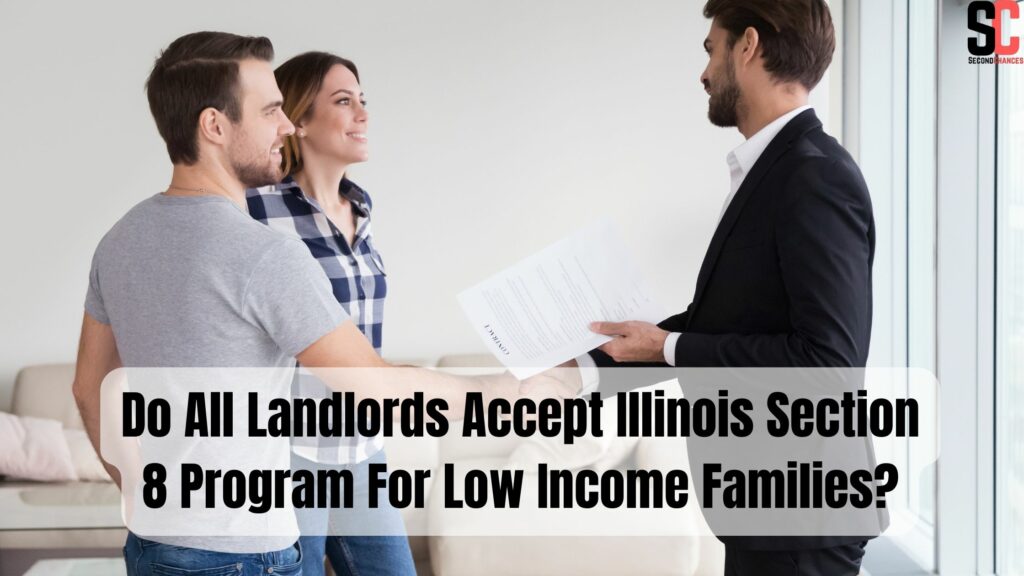
There are some landlords in Illinois who do not accept Section 8. Since June 2022, the program is voluntary for landlords. It might change if a bill is passed before the state legislature. A bill proposed by Congress would make payment methods an additional protected class that landlords cannot discriminate against. A similar law already exists in Virginia and other states.
In different areas, the percentage of landlords participating in Section 8 varies. Section 8 housing might be harder to find in areas with low participation, even once you are off the waiting list and have your voucher. You can locate voucher-approved housing near you, including single-family homes for rent that accept Section 8, through the HUD Resource Locator.
Does The Program Have A Waiting List?
Chicago Section 8 Waiting List
Vouchers are usually only available once you have been approved, and there is often a waiting list. The Cook County HCV program for Chicago residents is currently closed to new applicants, so you will need to check back periodically.
Aurora Section 8 Waiting List
There are only five-bedroom units available in public housing in the greater Aurora area. Currently, one-, two-, three-, and four-bedroom household units are closed to new applicants. There is no longer an HCV program accepting new applications. Project-based vouchers are only available to seniors 55 and over looking for a two-bedroom apartment. You can find more information about the Aurora Housing Authority on its website.
There are times when a lottery is formed because of high demand and an overabundance of applicants. Applicants who have been pre-approved will be placed in a lottery bank until their name is drawn. It can take several months for an application to be approved. The approval ratio is determined by the funding available from HUD and possibly other municipal agencies.
Things To Know Before Applying For Illinois Section 8 Program For Low Income Families
- Make sure you note which program you are applying to.
- Please answer all questions on the application form.
- The application form must be signed and dated by the head of the household.
- Fill out the application for all household members.
- The questions on the application apply to all members of the family listed there.
- If you have any questions, please contact your housing representative.
- The Housing Authority must be informed in writing within 10 business days of any changes that occur after this application has been submitted.
- The PHA will perform criminal background checks on all adult household members and checks on sex offender registrations.
- Personally identifiable information and income statements will be required at an intake/eligibility appointment.
- The completion of an application does not guarantee assistance.
- After submitting your application, you will be added to the waiting list.
- As your name rises to the top of the list, you will be scheduled for an intake/eligibility appointment.
- There may be a change in waitlist positions.
Buying A House Through Section 8 Housing Voucher: Pros And Cons
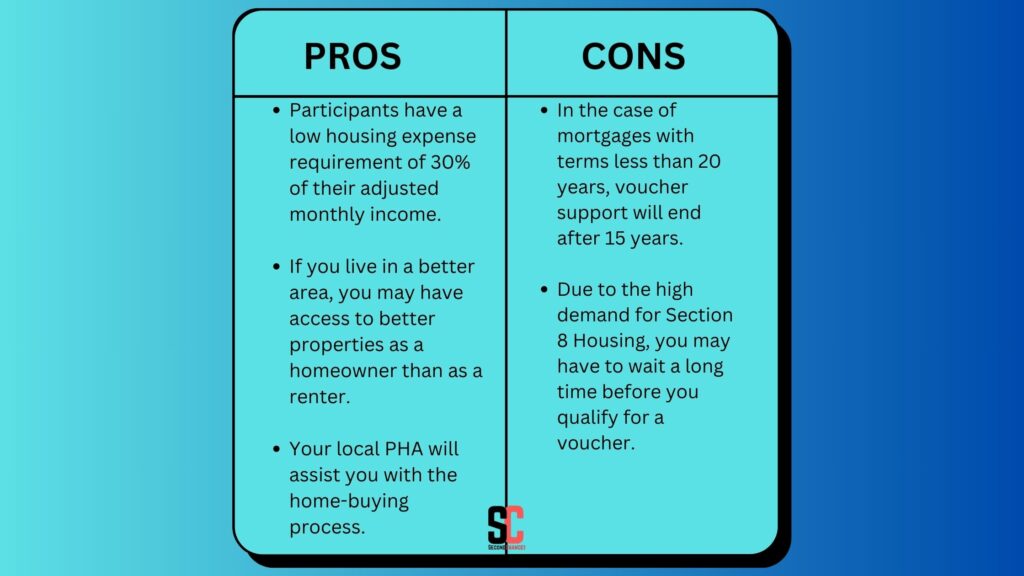
A Section 8 Housing program provides rental assistance, but participants can also use the funds to buy a home. The average family purchases a home and pays the same amount on a mortgage payment as if they were renting.
Nevertheless, one thing that’s important to note is that Section 8 Housing assistance is limited to 15 years. Therefore, if you take out a 30-year mortgage, you will only be able to utilize vouchers for half of the duration.
Here are some of the pros and cons of buying a house through Section 8.
Pros
- Participants have a low housing expense requirement of 30% of their adjusted monthly income.
- If you live in a better area, you may have access to better properties as a homeowner than as a renter.
- Your local PHA will assist you with the home-buying process.
Cons
- In the case of mortgages with terms less than 20 years, voucher support will end after 15 years.
- Due to the high demand for Section 8 Housing, you may have to wait a long time before you qualify for a voucher.
FAQs
What is Section 8?
Housing Choice Vouchers are Federal housing programs that provide housing assistance to low-income renters and homeowners. A rental subsidy limits the monthly rent payment of the assistance recipient through this form of assistance.
How is Section 8 Rent Calculated In Illinois?
A lower gross rent than the payment standard will result in your share of rent equal to the greater of 30% of your monthly adjusted income or 10% of your monthly gross income. The rent share must be less than 40% of your monthly adjusted income the first time you sign the lease.
How Do I Apply For Illinois Section 8 Program For Low Income Families?
The Department of Housing and Urban Development (HUD) administers Section 8 nationally. A public housing authority or other designated agency or organization runs the program locally. Below, you’ll find a search tool for the public housing authority in your area that administers Section 8.
How Do You Get Low Income Housing in Illinois?
Housing choice vouchers (HCVs) and public housing are administered by local public housing agencies (PHAs). You can apply for either program by contacting your local PHA.There are some PHAs that have long waiting lists, so you may want to apply to more than one, especially if you’re seeking low-income housing with no waiting list in Illinois.
How Much Rent Will I Have To Pay if I Have A Section 8 Voucher?
The amount of rent you pay depends on your income. A voucher will cover anything over 30% of your adjusted monthly income. You would pay $600 for a home renting for $900 per month, and the voucher would cover the difference of $300 as long as the Fair Market Rent in your area is equal to or greater than $900.
Conclusion
As a result, Illinois offers a wide variety of resources to assist low-income individuals and families in finding affordable housing through Illinois Section 8 Program For Low Income Families. Ensure you thoroughly research each program, including the Illinois Window Replacement Program, to understand the application process and eligibility requirements.

